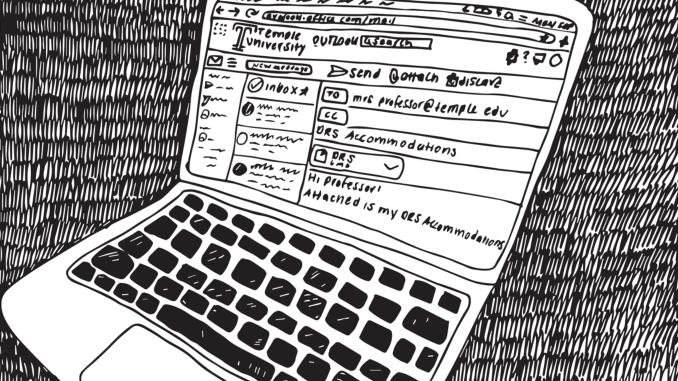
Disability Resources and Services, a department in the Division of Student Affairs that offers academic accommodations and resources for students with mental and physical disabilities, has been a great support system since the start of my freshman year. The DRS staff listened to my story about academic struggles with ADHD and offered helpful resources, like Read and Write, a text-to-speech program.
However, not all students know the extent of the accommodations offered.
Academic accommodations are helpful to students with disabilities, but most students aren’t utilizing them. Only 37 percent of students informed their college or university of their current disabilities, according to a 2022 press release from the National Center for Education Statistics. It’s likely students downplay their struggles because they don’t want to be vulnerable or don’t know what programs are available.
Students should apply for DRS accommodations when struggling with mental and physical disabilities because the department can help ensure they receive an accessible education. With a support system and personalized accommodations found at DRS, students can thrive and find confidence in their academic abilities.
Approximately 4,000 Temple students identified as having a disability for the 2021-22 academic year, and rates are increasing across disability services for the 2022-23 academic year, wrote Carrie Snyder, director of DRS, in an email to The Temple News.
DRS provides letters explaining accommodations to professors and advocates for students who don’t feel their accommodations are being respected. Professors are required to comply with student accommodations, but when they don’t, students may hesitate to assert the validity of their academic needs because of intimidation, and DRS can communicate with faculty for them.
“DRS is in every syllabus, but not a lot of students realize they could get the help they need,” said Mariem Mohamed, a sophomore English and psychology major.
Accessing accommodations is a simple process through the DRS portal. Students can log in with their Temple AccessNet account to schedule an appointment with DRS staff. If the accommodations are granted, students can send letters to their professors for each course.
DRS accommodations can be used both short term and long term, meaning resources are always there for students if they want to utilize them. Accommodations don’t impact the quality of education, but rather assist students in reaching their academic potential when they are facing debilitating circumstances.
“Students with a variety of disabilities — medical, physical, psychological, learning and even temporary — are encouraged to register with DRS to have accommodations ready to go, even if they never need them,” Snyder wrote. “It is like carrying an umbrella; you may never need to use it, but if you get caught in a downpour, you’re very glad that you have it.”
DRS provides other resources that students may not be aware of including accessible housing, field education and sign language services. Students Helping Owls Understand Temple, a peer support group within DRS, works with students to build self-advocacy skills, and the program Social Xchanges hosts recreational events for students with communication challenges. These services allow students to develop self-advocacy skills and connect with the Temple community.
“You don’t have to use them right away, it’s not a sign of weakness, but they’re there if you need them,” said Rani Vasudeva, a psychology and neuroscience professor. “It helps students feel more open and comfortable with their situations which can then improve their mental health.”
It’s normal to need accommodations for a disability, and all students are capable of academic achievement and success. DRS educates its members on disability, inclusion and accessibility while empowering students to become self-advocates. DRS accommodations and resources are important because they improve one’s college experience through acceptance, support and comfortability.


Be the first to comment